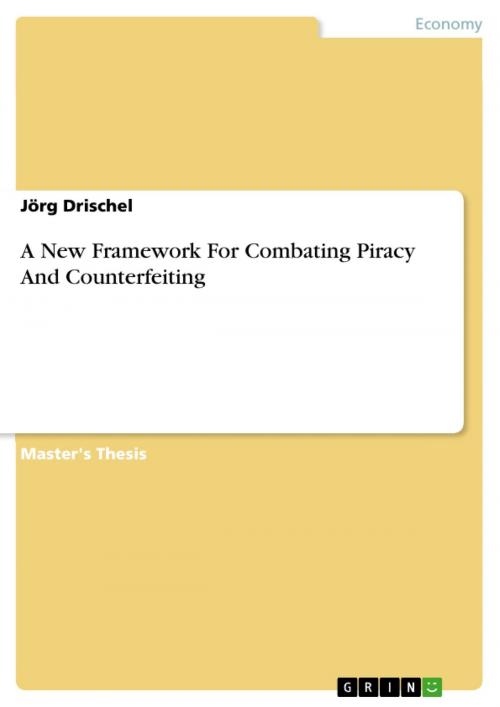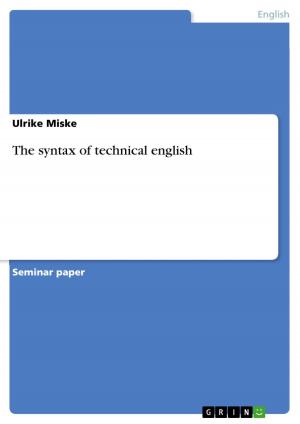A New Framework For Combating Piracy And Counterfeiting
Business & Finance, Management & Leadership, Management| Author: | Jörg Drischel | ISBN: | 9783638289511 |
| Publisher: | GRIN Publishing | Publication: | July 11, 2004 |
| Imprint: | GRIN Publishing | Language: | English |
| Author: | Jörg Drischel |
| ISBN: | 9783638289511 |
| Publisher: | GRIN Publishing |
| Publication: | July 11, 2004 |
| Imprint: | GRIN Publishing |
| Language: | English |
Master's Thesis from the year 2004 in the subject Business economics - Business Management, Corporate Governance, grade: 72%, University of the West of England, Bristol (Bristol Business School - MSc International Management), language: English, abstract: This study deals with the growing problem of piracy and counterfeiting successful companies have to face nowadays. The aim of the study is to recommend suitable strategies that victim companies should adopt in reaction to Intellectual Property Rights (IPR) infringement and trademark counterfeiting. In order to formulate appropriate strategies, one must first gain an understanding of the rationale behind counterfeiting for both producers as well as purchasers. It is also imperative to distinguish between different types of counterfeiting as some types certainly have a greater potential for harm. Each category requires a different approach. A look into buyer behaviour is necessary in order for firms to be able to formulate a successful anti-counterfeiting advertising campaign and to target the right audience as well as an investigation into the varying vulnerability to counterfeiting of different product categories. Companies as well as society as a whole are plagued by a phenomenon that is clearly not yet receiving the attention it deserves. Theft is a problem for every employer. It occurs in shops where would-be customers shoplift but it does not stop there. Employees stealing company property is a much bigger problem. This does not merely refer to a company's own workforce but also everyone at any stage of the supply chain. The trend toward outsourcing certainly has not helped as it is difficult enough to keep an eye on your own workforce without having the additional problem of policing the supply chain. Products can and do go missing due to theft. The phenomenon this study investigates is not conventional theft but rather theft of a different sort: theft of intellectual property and counterfeiting. Piracy and counterfeiting are not theft of finished products but of ideas, inventions, creations and discoveries, which are protected by trademarks, patents and copyrights.
Master's Thesis from the year 2004 in the subject Business economics - Business Management, Corporate Governance, grade: 72%, University of the West of England, Bristol (Bristol Business School - MSc International Management), language: English, abstract: This study deals with the growing problem of piracy and counterfeiting successful companies have to face nowadays. The aim of the study is to recommend suitable strategies that victim companies should adopt in reaction to Intellectual Property Rights (IPR) infringement and trademark counterfeiting. In order to formulate appropriate strategies, one must first gain an understanding of the rationale behind counterfeiting for both producers as well as purchasers. It is also imperative to distinguish between different types of counterfeiting as some types certainly have a greater potential for harm. Each category requires a different approach. A look into buyer behaviour is necessary in order for firms to be able to formulate a successful anti-counterfeiting advertising campaign and to target the right audience as well as an investigation into the varying vulnerability to counterfeiting of different product categories. Companies as well as society as a whole are plagued by a phenomenon that is clearly not yet receiving the attention it deserves. Theft is a problem for every employer. It occurs in shops where would-be customers shoplift but it does not stop there. Employees stealing company property is a much bigger problem. This does not merely refer to a company's own workforce but also everyone at any stage of the supply chain. The trend toward outsourcing certainly has not helped as it is difficult enough to keep an eye on your own workforce without having the additional problem of policing the supply chain. Products can and do go missing due to theft. The phenomenon this study investigates is not conventional theft but rather theft of a different sort: theft of intellectual property and counterfeiting. Piracy and counterfeiting are not theft of finished products but of ideas, inventions, creations and discoveries, which are protected by trademarks, patents and copyrights.















